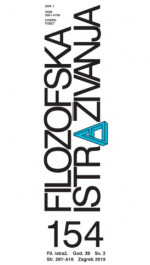Tjelovježba i igranje-igara u četirima konstrukcijama sretnog ljudskog života
Physical Exercise and Game-Playing in the Four Constructions of Happy Human Life
Author(s): Matija Mato ŠkerbićSubject(s): Renaissance Philosophy, Early Modern Philosophy, Sports Studies
Published by: Hrvatsko Filozofsko Društvo
Keywords: physical exercise; game; play; game-playing; Bernard Herbert Suits; Thomas More; Utopia; Franciscus Patricius; La Città Felice; Tommaso Campanella; Civitas Solis;
Summary/Abstract: The paper was prompted by B. H. Suitsʼ construction of Utopia and solutions for the meaningful and happy life of every single human, presented in The Grasshopper: Games, Life and Utopia (1978). The author considers, critically evaluates and confronts the role of human physical exercise and game-playing in four constructions of meaningful and happy human life, presented in three Renaissance philosophical writings: De optimo reipublicae statu deque nova insula Utopia libelous (1516) by T. More, La città felice (1553) by F. Patricius, and Civitas Solis. Idea reipublicae philosophicae (1603) by T. Campanella, with the aforementioned B. H. Suitsʼ postmodern writing. The authorʼs thesis is that Suitsʼ solution to human meaningful and full life, which consists in constant game-playing or engaging in only autotelic and intrinsically valuable activities, contains all the leisured intentions of other considered constructions. Moreover, although Suits aims at contemporary humans, it is a solution for all historical periods, conditions or circumstances.
Journal: Filozofska istraživanja
- Issue Year: 39/2019
- Issue No: 02/154
- Page Range: 335-346
- Page Count: 12
- Language: Croatian

